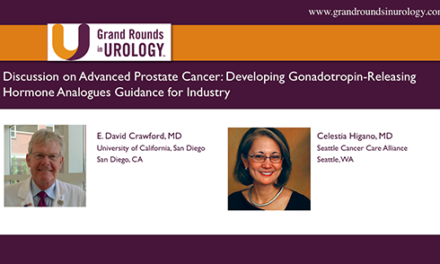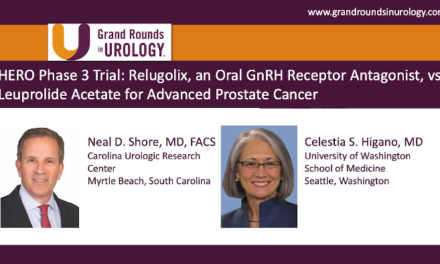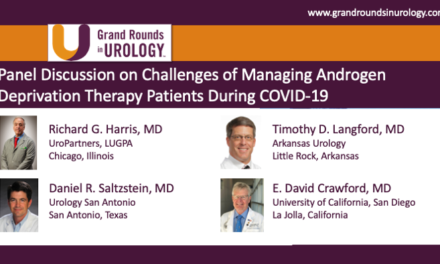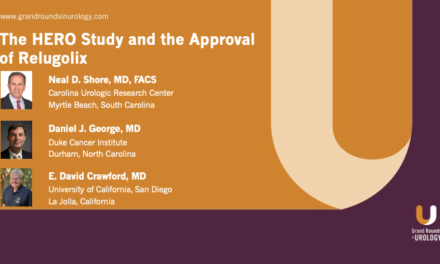Thomas E. Keane, MD, presented “Timing of ADT with Chemotherapy in 2019” during the 29th Annual International Prostate Cancer Update on January 26, 2019 in Beaver Creek, Colorado.
How to cite: Keane, Thomas E. “Timing of ADT with Chemotherapy in 2019” January 26, 2019. Accessed Dec 2024. https://dev.grandroundsinurology.com/timing-of-adt-with-chemotherapy-in-2019/
Timing of ADT with Chemotherapy in 2019 – Summary:
Thomas E. Keane, MD, reviews the data supporting and opposing the advancement of chemotherapy into the metastatic castration-sensitive prostate cancer (mCSPC) disease state. He then discusses a current trial introducing chemotherapy in patients prior to androgen deprivation therapy (ADT).
Abstract:
The use of chemotherapy in prostate cancer has typically been reserved for patients with very advanced disease. Recently, as a result of a number of phase III randomized, controlled trials, this modality has been advanced to the castrate-sensitive metastatic disease state with very encouraging results.
The results of the E3805 (CHAARTED) trial were surprising to the urologic community. It showed a significant overall survival benefit with chemohormonal therapy in mCSPC patients. However, only patients with high-volume prostate cancer saw benefits in extent of metastatic disease. The STAMPEDE trial then confirmed the observations from CHAARTED.
On the contrary, the GETUG-AFU 15 study showed a highly significant biochemical progression-free survival, but no overall survival benefit to docetaxel plus androgen-deprivation therapy (ADT) in mCSPC. Notably, patients who failed in GETUG-AFU 15 did not have the availability of enzalutamide and abiraterone, while those in CHAARTED did.
When comparing toxicity data from GETUG-AFU 15, CHAARTED, and TAX327, the study that led to docetaxel’s approval in castration-resistant prostate cancer (CRPC), patients in GETUG-AFU 15 showed the relatively highest rates of febrile neutropenia. This suggests that docetaxel may be surprisingly more toxic in mCSPC. Additionally, docetaxel pharmacokinetics have proven to play a role in these variations of toxicity rates.
This presentation reviews the data examining the possibility that if docetaxel leads to greater toxicity in patients in a pre-castration state, then it may also lead to greater efficacy. An in vitro study, animal model, breast cancer study, and human trials in prostate cancer have explored this idea. It will also briefly discuss a current phase II trial introducing chemotherapy prior to ADT. Finally, It will review the current issues physicians should consider when initiating ADT.
About the International Prostate Cancer Update
The International Prostate Cancer Update (IPCU) is an annual, multi-day CME conference focused on prostate cancer treatment updates. The conference’s faculty consists of international experts, and the event caters to urologists, medical oncologists, radiation oncologists, and other healthcare professionals. Topics encompass prostate cancer management, from diagnosis to treating advanced and metastatic disease. Dr. Keane presented this lecture during the 29th IPCU in 2019. Please visit this page in order to learn more about future IPCU meetings.
ABOUT THE AUTHOR
Thomas E. Keane, MD, is Professor and Chairman of the Department of Urology at the Medical University of South Carolina in Charleston. Dr. Keane specializes in managing prostate, bladder, and renal cancers.
An avid researcher, Dr. Keane has served as principal investigator or co-investigator on more than 20 major clinical and preclinical studies. Much of his work focuses on innovative concepts in translational research, including utilizing human tumor xenografts to investigate the efficacy of new therapies as they relate to GU malignancies with particular reference to cytotoxic agents, sphingolipids, and boron-containing compounds. He holds a United States patent for sphingolipid derivatives and their use.
Dr. Keane’s research has led to publication of more than 100 articles peer-reviewed in such journals as The Journal of Urology, Urologic Oncology, and the Journal of Vascular Surgery. He provides editorial services to publications ranging from Urology to the International Journal of Cancer and is co-editor of the text Glenn’s Urologic Surgery, 6th, 7th, and 8th Editions. He is an accomplished speaker, having delivered many presentations to professional societies and symposia throughout the United States and abroad.






